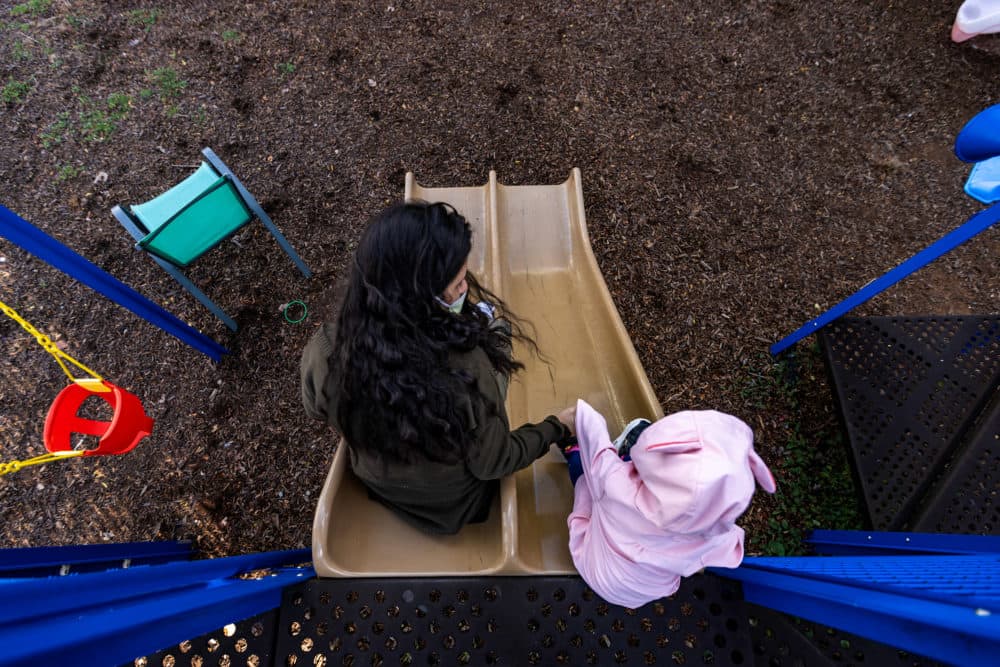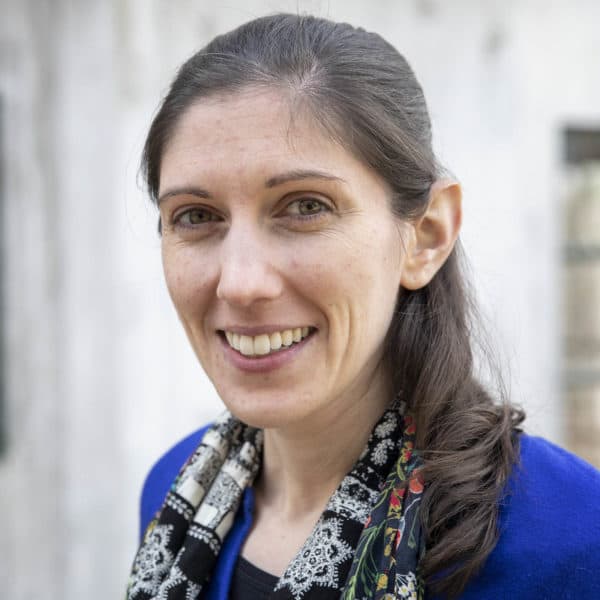Advertisement
Three hour wait, three days in a row: Mass. shelter hotline leaves some families desperate
Play
At the end of August, Paula and her toddler were evicted from their apartment after a new property manager declined to renew the lease.
What happened next revealed a crack in Massachusetts' state-run family shelter system. The problem is raising particular concerns as temperatures drop, and thousands of families are seeking emergency housing.
Paula and her daughter stayed with her dad at first, but he told them they couldn't live there anymore. Then, she turned to a former partner in search of a roof.
She said the relationship turned violent again, so she left. (WBUR is not using Paula's last name to protect her identity because she is a survivor of domestic violence.)
Bouncing between friends and relatives, she knew she needed a better solution. She called the state’s Emergency Assistance shelter hotline. She was put on hold.
After three hours, someone finally picked up, but all she could hear were background noises.
“For about 10 minutes, I kept saying: ‘Hello? Hello?’ ” said Paula. Her optimism fading, she hung up.
"My half-full glass broke," she said. The experience left her feeling "discouraged, defeated and overpowered."
Massachusetts is the only state in the country that guarantees a “right to shelter” for families experiencing homelessness. The state operates a shelter program for parents and children who meet certain income limits and other criteria, but the first step for many of them is getting through to the state-run hotline.
Families seeking help as well as a number of social service agencies report that it can take hours — and sometimes days — to reach someone on the hotline. Critics say the phone line needs revamping, and they emphasize the consequences of not getting help quickly can be devastating.
“I have had clients who went back to their abusers because they weren't able to access a shelter.”
Liz Alfred, Greater Boston Legal Services
After trying and failing to get through to the hotline, Paula tried again the next day. She waited for another three hours, then her cell phone died. On the third day, she called from an office lobby, where she knew she'd be able to charge her phone — and where her daughter could nap while they waited.
She finally got through after a little more than three hours.
Paula recalled the voice on the other end of the line telling her, “Ma'am, you're going to have to call back tomorrow to find shelter. It's too late in the day.”
Paula begged the operator for help, telling her she had nowhere to go. She was put on hold, she said, and then disconnected.
Frustrated and feeling desperate, Paula turned to Greater Boston Legal Services. A staff attorney there, Liz Alfred, emailed her contacts at the state’s shelter program. Within an hour, Alfred said they found a place for Paula and her daughter.
Unlike the system for single adults who don't have housing, which is primarily run by nonprofits, the family shelter system in Massachusetts is run by the Department of Housing and Community Development (DHCD). There are a few nonprofit family shelters, but most families with children receive services through the state. Experts say a state-run shelter system like this is highly unusual.
The phone line troubles Paula encountered have become the norm, Alfred said. During the pandemic, the state closed field offices and directed families to apply for shelter by phone. Program staff continue to instruct people to use the hotline.
“Pre-COVID, you could go into the office, and you could sit there all day,” Alfred said. “But at least if you were there with your suitcases and your kid, there is some way that DHCD understands that they need to deal with you.”
On the phone, she said, nobody sees you, and nobody has to deal with you.
The Department of Housing and Community Development reopened its field offices last year, but some open only on limited days. The offices and the hotline close in the evenings, and on weekends and holidays. As recently as mid-November, the state website still indicated that field offices were closed for in-person applications due to the pandemic. After receiving inquiries from WBUR, the state updated the site. But social service organizations report that their clients are routinely required to use the hotline.
DHCD declined interview requests, but a spokeswoman said it’s working to improve the system. She said the hotline received 8,000 calls last month, and the typical wait time is two or more hours.
“We see the state working very hard in an unprecedented crisis. But that hotline needs to be fixed.”
Michael Moreshead
Phone calls are answered by 27 homeless coordinators, who split their time between field offices, answering calls to the hotline and responding to email referrals. The spokeswoman declined to say whether the state plans to increase staffing or make an online application available, as it has done with other housing assistance programs.
Alfred, of Greater Boston Legal Services, said delays in finding shelter can cause real problems.
Sometimes it means a family gets separated, for example when only one child can stay with a relative, and a sibling must go with a friend. Other times it means staying in an unheated basement or worse.
“I have had clients who went back to their abusers because they weren't able to access a shelter,” Alfred said.
Some nonprofits try to help families waiting to enter the state system, or those that don't qualify, by putting them up in hotel rooms.
“We have emergency short-term funds,” said Michael Moreshead, the assistant to the executive director at Friendly House in Worcester. “But those funds are tight. And we're worried about the winter, frankly.”
He said the lack of affordable housing is the worst he’s seen, and it’s pushing more families into homelessness. He said it’s hard for the system to keep up.
“We see the state working very hard in an unprecedented crisis,” Moreshead said. “But that hotline needs to be fixed.”
Recently, the state has provided shelter for more than 3,000 families each month, an increase from the same time last year. When Paula became one of them, she was impressed.
“It's amazing,” she said of the shelter. She and her daughter have their own room. They get diapers. There’s a playroom with books. On their first night, another mom offered to help them find groceries.
“She said, ‘Hey, I'll walk with you. I'll go with you and show you the shortcut,’ ” Paula recalled. The woman told Paula she didn’t have to go it alone.
That was a relief. But, Paula reflected, that’s true only if you can somehow make it past the hotline and get shelter.
